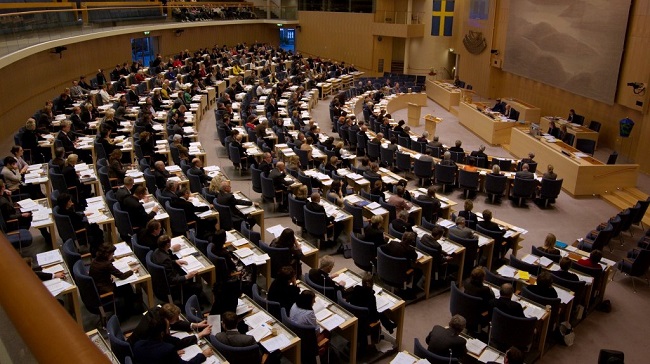How laws are made in Sweden

The Swedish Parliament known as Riksdag
Each year, the Swedish Government lays some 200 legislative proposals, normally in the form of a government bill, before the Riksdag (Swedish parliament).
Some bills contain proposals for new legislation, requiring extensive deliberation and debate before a vote can be taken, while others consist of proposals for policy guidelines or major or minor amendments to existing laws. A growing proportion of legislation affecting Sweden is enacted by the European Union. Some of these laws apply directly, without prior sanction by the Riksdag, while others must be implemented in existing Swedish legislation before they can take effect.
Initiative
Although most legislative proposals laid before the Riksdag (Swedish parliament) are initiated by the Government, some bills may be based on suggestions put forward by the Riksdag or by private citizens, special interest groups or public authorities.
The inquiry stage
Before the Government can draw up a legislative proposal, the matter in question must be analysed and evaluated. The task may be assigned to officials from the ministry concerned, a commission of inquiry or a one-man committee. Inquiry bodies, which operate independently of the Government, may include or co-opt experts, public officials and politicians. The reports setting out their conclusions are published in the Swedish Government Official Reports series (Statens Offentliga Utredningar, SOU).
The referral process
Before the Government takes up a position on the recommendations of a commission of inquiry, its report is referred for consideration to the relevant bodies. These referral bodies may be central government agencies, special interest groups, local government authorities or other bodies whose activities may be affected by the proposals. This process provides valuable feedback and allows the Government to gauge the level of support it is likely to receive. If a number of referral bodies respond unfavourably to the recommendations, the Government may try to find an alternative solution.
Government bill
When the referral bodies have submitted their comments, the ministry responsible drafts the bill that will be submitted to the Riksdag. If the proposed law has important implications for private citizens or the welfare of the public, the Government should first refer the proposal to the Council on Legislation to ensure that it does not conflict with existing legislation.
The parliamentary process
Responsibility for approving all new or amended legislation lies with the Riksdag. Legislative proposals, whether proceeding from the Government or a private member, are dealt with by one of the parliamentary committees. Any of the Riksdag’s 349 members can table a counter-proposal to a bill introduced by the Government. Such a proposal is called a motion. If a motion is formally adopted in the Riksdag, the Government is bound to implement its provisions. When the committee has completed its deliberations, it submits a report and the bill is put to the chamber of the Riksdag for approval. If adopted, the bill becomes law.
Promulgation
After its successful passage through the Riksdag, the new law is formally promulgated by the Government. All new or amended laws are published in the Swedish Code of Statutes (abbreviated in Swedish as SFS).
Acts of parliament and where to find them
- All current laws are published in the Swedish Code of Statutes (in Swedish only). Copies of the Code are kept at the Library of the Riksdag and most public libraries. Full-text electronic versions of valid laws and ordinances are available in Swedish on the Riksdag website.
- All information on legislation in the public domain may be accessed via Lagrummet, the official Internet portal for information on Swedish legislation (currently in Swedish only). Visitors to the site have access to all statutes currently in force and information on impending legislation.
- Some ministries and government agencies publish English translations of the laws and ordinances that apply in their field.
Swedish Government

